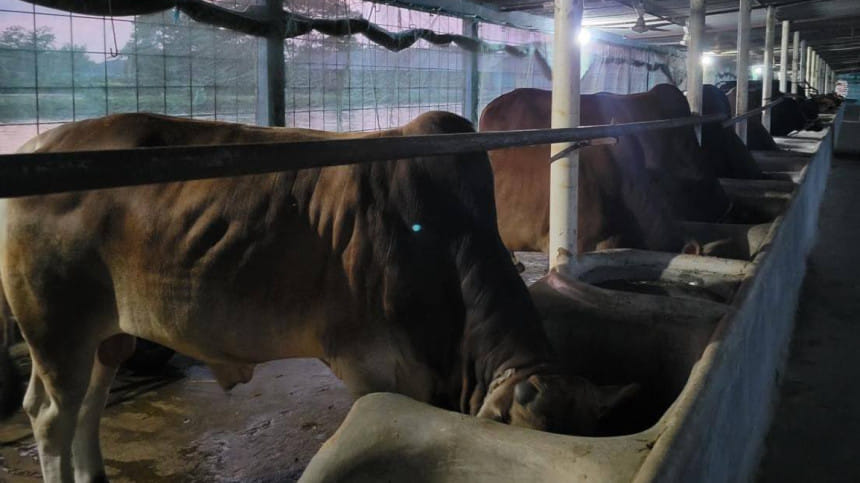Lumpy Skin Disease threatens Eid cattle market in Netrokona

As Eid-ul-Azha draws near, cattle farmers in Netrokona are working tirelessly to prepare their livestock for sale. However, growing concerns over the spread of Lumpy Skin Disease (LSD) are casting a shadow over their efforts, threatening both livelihoods and the sacrificial season.
Farmers across the district are using traditional, chemical-free methods—such as green grass, straw, oil cakes, and grains—to fatten their cattle. But with the recent rise in LSD cases, many fear their healthy animals could be infected just days before Eid.
Asked about the current situation regarding the LSD outbreak, Arifa Parvin Ripa, livestock officer of Netrokona Sadar upazila, said, "This new virus, much like Covid-19 in its spread, has become a serious threat to livestock,"
"We're seeing at least 10–12 cases of LSD daily at our hospital. It's a highly contagious skin disease, and there's still no effective vaccine or treatment," she added.
According to the District Livestock Department, a total of 134,077 cattle has been prepared for Eid-ul-Azha across the 10 upazilas of Netrokona. This year, the district's internal demand stands at 106,100 cattle. Therefore, there will be a surplus of 27,977 cattle, which can potentially be supplied to other parts of the country.
Last year, 103,284 cattle were sacrificed in Netrokona.
Despite the surplus, farmers say rising feed costs is making the situation more difficult.
"Cattle feed prices have soared this year. We're barely breaking even," said Sujit Majumdar, a farmer from Amtala village in Netrokona Sadar.
"If Indian cattle enter the market in large numbers again, local farmers like us will incur heavy losses," he added.
Mahmudul Hasan Fahim, a farm owner near Netrokona town, has 40 cattle ready for sacrifice, valued between Tk 1 lakh and Tk 5 lakh each.
"We're extremely anxious. LSD has already appeared in the area. If any of my cattle fall ill before Eid, it'll be a huge loss," he said.
According to the District Livestock Office, there are 12,665 cattle farms in Netrokona, both small and large. All have readied domestic cattle for sacrifice, and officials are closely monitoring for harmful fattening practices.
"We have already formed several monitoring teams, including veterinary doctors, to be deployed at all cattle markets," said Additional District Livestock Officer Sadiqul Islam.
"Our teams are working even at the grassroots level to ensure no harmful chemicals are used in fattening."
When asked about the symptoms of LSD, Arifa Parvin said that the affected cow initially develops a fever and loses its appetite. Along with the fever, saliva starts to drip from its nose and mouth, its legs swell, and fluid accumulates between its hind legs. The skin in various parts of the animal's body forms lumps, hair falls off, and wounds appear.
"These wounds can rapidly spread to other parts of the body," she said, adding that bleeding may occur from the wounds.
In some areas, swelling occurs, which may burst open, releasing flesh-like tissue and pus, she said.

 For all latest news, follow The Daily Star's Google News channel.
For all latest news, follow The Daily Star's Google News channel. 



Comments